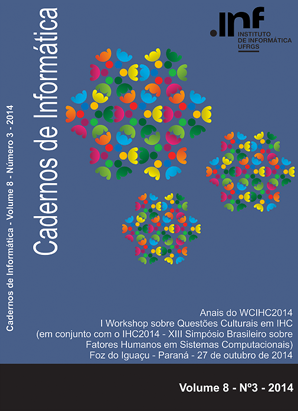Lessons from ICT Design at a Healthcare Worker-Centered System for a Chronic Mental Care Hospital (artigo convidado)
Resumo
We report on our research on designing natural ICT tools and solutions for integration into a non-ICT based workflow at a Brazilian chronic care hospital. Our healthcare worker-centered approach for continuous lifecare contrasts from the more typical acute care situations where systems are geared towards a combination of patientcentered or administrator-centered designs. While acute care patients tend to spend a relatively short period of time in the hospital with life and death situations, chronic mental care focuses on improving a patient’s life quality as they age. Thus, the therapeutic processes are geared towards collaboratively preparing patients to be able to establish a routine for what is defined as an independent normal life in their community. We report on three main findings from our worker-centered design in this environment: 1.Supporting workers communication and workflow using an online social intranet is effective, 2. Designing for appropriation as well as adoption is important and 3. Public workflow visualization can influence workers behavior, according to their cultural values. The approach we suggest may apply to other long-term assistant scenarios such as nursing homes, care for people with disabilities and
teaching and parenting contexts.
Downloads
Não há dados estatísticos.
Downloads
Publicado
2014-10-11
Como Citar
Anacleto, J., Fels, S., & Calderon, R. (2014). Lessons from ICT Design at a Healthcare Worker-Centered System for a Chronic Mental Care Hospital (artigo convidado). Cadernos De Informática, 8(3), 01–08. Recuperado de https://seer.ufrgs.br/index.php/cadernosdeinformatica/article/view/v8n3p01-08
Edição
Seção
Artigos Completos

